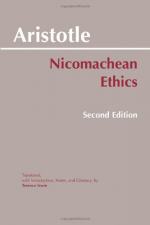
|
| Name: _________________________ | Period: ___________________ |
This test consists of 15 multiple choice questions and 5 short answer questions.
Multiple Choice Questions
1. Whom does Aristotle cite as saying that those who claim that favor-doers are more loving than favor-receivers say so from a debased point of view?
(a) Pythagoras.
(b) Socrates.
(c) Homer.
(d) Epicharmus.
2. In what sort of friendship are there no complaints, according to the view of Aristotle?
(a) Pleasure.
(b) Utility.
(c) Virtue.
(d) Familial.
3. What fact does Aristotle point to in support of the hypothesis that living itself is a good?
(a) That without life there can be no other goods.
(b) That the best things are living.
(c) That good men desire good things.
(d) That all men desire to live.
4. Aristotle notes that each political constitution involves friendship to the same degree that it involves what?
(a) Benevolence.
(b) Trust.
(c) Justice.
(d) Truth.
5. What person does Aristotle claim most notably feels love just in knowing a person, and not in receiving love returned?
(a) A mother.
(b) A father.
(c) A just ruler.
(d) A spouse.
6. With what sort of friendship is VIII.14 concerned?
(a) Virtuous friendships.
(b) Familial friendships.
(c) Equal friendships.
(d) Unequal friendships.
7. In X.1, Aristotle says that people educate the young by what two means?
(a) Truth and justice.
(b) Philosophy ad rhetoric.
(c) Pleasure and pain.
(d) Friendship and love.
8. With what is IX.3 concerned?
(a) The accepting of goods from friends.
(b) The corruption of friendships.
(c) The distribution of goods to friends.
(d) The eternity of friendships.
9. What two forces does Aristotle claim determine the strength of an obligation to another person, in a situation where there is a conflict, according to IX.2?
(a) Justice and mercy.
(b) Debt and love.
(c) Beauty and necessity.
(d) Earth and fire.
10. Which of the following intellectual virtues does Aristotle say the incontinent person cannot have, at the beginning of VII.10?
(a) Knowledge.
(b) Practical judgment.
(c) Intellect.
(d) Art.
11. What does Aristotle state is akin to friendship in the beginning of IX.5?
(a) Familial relationships.
(b) Sound reason.
(c) Goodwill.
(d) Love.
12. When will virtuous upbringing and exercises no longer be painful in the theory of Aristotle?
(a) When the world ends.
(b) When they are habitual.
(c) When they are enforced by law.
(d) When there is a just ruler.
13. While in the throes of true friendship, Aristotle states at the end of Book IX that one has the same relationship with a friend as he does with whom?
(a) His lover.
(b) His father.
(c) Himself.
(d) His god.
14. With what sort of friendship is VIII.12 concerned?
(a) Friendship between inferiors and superiors.
(b) Friendship in a family.
(c) Friendship with foreigners.
(d) Friendship among women.
15. What is the impasse Aristotle confronts in IX.8?
(a) Whether one ought to not love himself at all.
(b) Whether one ought to love himself like he loves others.
(c) Whether one should love himself or another the most.
(d) Whether one should love his parents or his wife the most.
Short Answer Questions
1. With what is the second part of the reasoning part of the soul concerned in the view of Aristotle?
2. Aristotle states, in Book VIII, that friendship is a kind of what?
3. In what period of life does Aristotle state that the friendship of utility most frequently appears?
4. What do the natural sorts of active conditions of the human person need, by Aristotle's observations, in order to be used for the good?
5. What does Aristotle, in VIII.5, say causes forgetfulness of friendship?
|
This section contains 561 words (approx. 2 pages at 300 words per page) |

|




